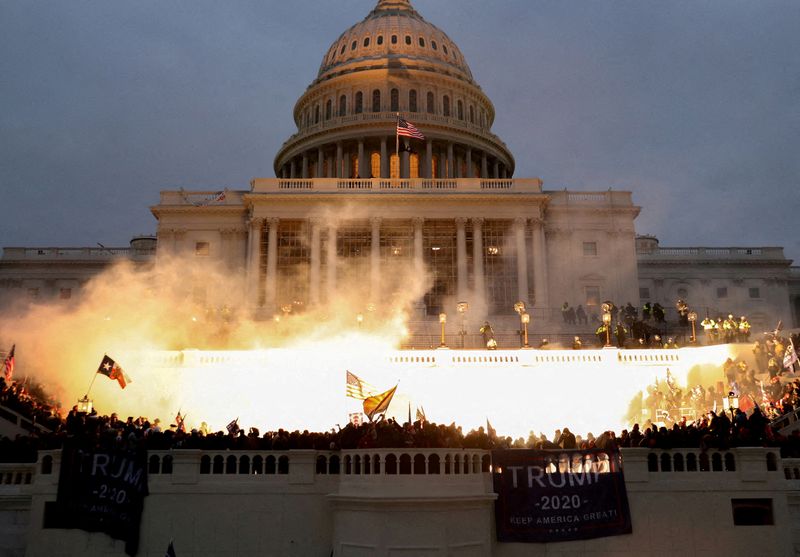US Supreme Court to weigh challenge to Jan. 6 obstruction charge
2023.12.13 10:33

© Reuters. FILE PHOTO: An explosion caused by a police munition is seen while supporters of U.S. President Donald Trump riot at the U.S. Capitol Building in Washington, U.S., January 6, 2021. REUTERS/Leah Millis//File Photo
By John Kruzel
WASHINGTON (Reuters) -The U.S. Supreme Court on Wednesday agreed to decide whether a defendant arrested in connection with the Jan. 6, 2021, attack on the Capitol can be charged with obstructing an official proceeding in a dispute with potential implications for one of Republican former President Donald Trump’s four criminal cases.
The justices took up an appeal by a Jan. 6 defendant after a federal appellate court allowed charges against him under a U.S. law that makes it a crime to obstruct or impede an official proceeding, based on accusations that he assaulted police as Congress met to certify Democrat Joe Biden’s 2020 election victory over Trump.
At least 315 people have been charged by the U.S. Justice Department with obstructing an official proceeding in connection with the Jan. 6 attack. The Supreme Court is expected to hear arguments in the case in the coming months and issue a ruling by the end of June.
The case arose after defendant Joseph Fischer was indicted on seven charges following the Jan. 6 riot including one count under a provision of federal criminal law for anyone who “corruptly … obstructs, influences and impedes any official proceeding.”
U.S. District Judge Carl Nichols, a Trump appointee, granted Fischer’s pretrial motion to dismiss his obstruction charges, ruling that the statute applied only in cases in which a defendant had taken “some action with respect to a document, record or other object.”
Federal prosecutors appealed that ruling to the U.S. Court of Appeals for the District of Columbia Circuit. A divided three-judge panel on the D.C. Circuit in April 2023 reversed Nichols’ ruling, saying that the statute was not limited to documents and records, but instead “applies to all forms of corrupt obstruction of an official proceeding.”
The charge carries a maximum sentence of up to 20 years in prison with a conviction.
Fischer is awaiting trial on his other criminal charges including one count of assaulting, resisting or impeding officers and one count of civil disorder.
After the election, Trump and his allies made false claims that it had been stolen from him through widespread voting fraud. On the day that Congress met to certify Biden’s victory, Trump supporters stormed the U.S. Capitol, broke through barricades, attacked police officers, vandalized the building and forced lawmakers and others to flee for safety.
In federal charges brought by Special Counsel Jack Smith, Trump faces four counts related to his efforts to overturn the 2020 election results. These included: conspiracy to obstruct an official proceeding; obstruction of and attempt to obstruct an official proceeding; conspiracy to defraud the United States; and conspiracy to deprive citizens of their voting rights.
Trump, the frontrunner for the Republican nomination to challenge Biden in the 2024 U.S. election, has pleaded not guilty to these charges, as well as charges stemming from three other ongoing criminal prosecutions.
More than 315 Jan. 6 defendants have been charged with corruptly obstructing, influencing or impeding an official proceeding or attempting to do so, according to U.S. Justice Department figures.








